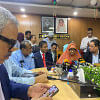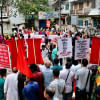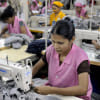Normalcy returning to garment sector

After more than two weeks of unrest in the garment sector over minimum wages, normalcy has started to be restored with almost all factories reopening and workers returning to their workplaces yesterday.
Only a few factories in Ashulia are yet to reopen but they are getting ready to do so soon, said Faruque Hassan, president of the Bangladesh Garment Manufacturers and Exporters Association (BGMEA).
"I hope all the factories will reopen by tomorrow as the workers are coming back to their workplaces," he told The Daily Star yesterday.
Workers of one or two garment factories in Mirpur areas did not join their workplaces yesterday and they demonstrated for a few hours at Mirpur 10 in Dhaka, he added.
A section of workers has not accepted a minimum monthly wage declared on November 7 by a government-formed board representing all sides. They continue to demand Tk 23,000.
The minimum wage board has increased the minimum wage for garment workers to Tk 12,500, equivalent to around $113.63, from Tk 8,000 at present.
It will come into effect from December 1 and workers will receive salaries under the new structure in January.
Almost all the factories have been reopened and normalcy has started to be restored in the garment sector as the workers are coming back to their workplaces, said Nazma Akter, president of Sammilito Garment Sramik Federation.
Md Towhidur Rahman, president of Bangladesh Apparels Workers' Federation, echoed Akter.
Meanwhile, the BGMEA president sent another letter to the American Apparel & Footwear Association (AAFA) yesterday seeking higher prices from retailers and brands under the AAFA in line with the hike in the wages.
The letter was especially addressed to a number of retailers and brands which had themselves sent a letter to Prime Minister Sheikh Hasina on October 11 urging for urgent action regarding the labour unrest.
The retailers and brands are AEO Inc, Abercrombie & Fitch, Adidas, Amer Sports, Burton, Gap Inc, Hugo Boss AG, KMD Brands, Levi Strauss & Co, Lululemon, Patagonia, Puma SE, PVH Corp, SanMar, Under Armour and ALDI South Group.
The BGMEA is going to hold a meeting today with clothing retailers and brands which source garment items from Bangladesh, said Hassan.
They will be updated about the labour unrest and asked to pay higher rates in line with the wage hike, he said.
The new minimum wages came at a time when the global economy, alongside that of Bangladesh, is passing through an unprecedented situation, said Hassan in the letter.
The garment industry in Bangladesh is feeling the heat of this crisis, especially from soaring inflation and significant increase in all input costs, including that of fuel, gas, electricity and transportation, he said.
"Now to align with global climate action agenda, our factories are making further investment to reduce GHG emission and be more resource efficient," read the letter.
Not only that, for ensuring workplace safety, comfort for workers and to reduce fatigue, factories are upgrading machine, process and production method, said Hassan in the letter.
This will be challenging for many of the factories to implement the new wage in the current economic and financial circumstances. However, ensuring decent living of the workers is also a top priority for garment makers, as well as for global brands and retailers, he added.
"Since we have accepted the new minimum wage, we will ensure implementation of it, and we need your support in terms of responsible purchasing practice," read the letter.
"To ensure uninterrupted and smoother operation in the industry, it is important that prices of all goods which will be shipped from December 1, 2023 are duly adjusted/up-charged covering the increment in wage component," it added.

 For all latest news, follow The Daily Star's Google News channel.
For all latest news, follow The Daily Star's Google News channel. 








Comments